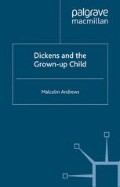Abstract
Angus Wilson, in his essay in Dickens 1970, draws attention to the eighteenth-century debate on primitivism in its two main forms — the Golden Age and the Noble Savage. Wilson argued, rightly I think, that Dickens renounced these more ‘conventional’ primitivisms, but ‘fell victim to a large extent to the primitivism of childhood as a pre-Adamite Eden’. We are familiar with this fairly habitual perspective on childhood in Dickens: ‘these little people … who are so fresh from God’ (OCS, i, 4), reflects the elderly narrator in The Old Curiosity Shop, as he wonders about Nell. In similar manner the narrator of A Christmas Carol apostrophises Tiny Tim: ‘Spirit of Tiny Tim, thy childish essence was from God!’ (CB,69). Children in Dickens’s fiction are often presented as little newcomers from a pre-lapsarian world, bewildered as they try to make their way through the streets of Victorian London. It was precisely the perception of this stark incongruity which gave Dickens the germ for The Old Curiosity Shop. Wilson is right, I think, in distinguishing between the relevant primitivisms; but at certain points it becomes peculiarly difficult to separate the more ‘conventional’ from the childhood-as-Eden primitivisms.
Access this chapter
Tax calculation will be finalised at checkout
Purchases are for personal use only
Preview
Unable to display preview. Download preview PDF.
Notes
Peter Coveney, The Image of Childhood (Penguin, 1967), p. 110.
One of the most penetrating studies of this kind is Dirk Den Hartog’s Dickens and Romantic Psychology (Macmillan, 1987). My later discussion of Dombey & Son owes much to the stimulus of Den Hartog’s chapter on that novel. Another important contribution to this debate is Mark Spilka’s essay, ‘On the Enrichment of Poor Monkeys by Myth and Dream’ (see below, note 26).
For much of the following discussion of primitivism I am indebted to Louis Whitney’s Primitivism and the Idea of Progress (New York: Octagon Books, 1965).
Bernard Smith, The European Vision and the South Pacific (1959; 2nd ed. Yale University Press, 1985).
H. N. Fairchild, The Noble Savage: A Study in Romantic Naturalism (New York: Russell & Russell, 1928), p. 338.
Ibid., p. 299.
Lord Kames, Sketches of the History of Man (Edinburgh, 1788), II, 153–4. Quoted in Whitney, op. cit., pp. 277–8: see her Chapter 2 for an extended discussion of the debate on ‘luxury’.
Anon., ‘On Avarice and Luxury, and their Influence on the Happiness of a Trading People’, London Magazine, vol. 48 (1779), pp. 538, 554.
Thomas Holcroft, Anna St.Ives (1792): quoted in Fairchild, p. 163.
Lord Monboddo, The Origin and Progress of Language (1773: 2nd ed., 1774), I, 147 (quoted in Whitney, pp. 42–3).
William Wordsworth, The Prelude, Book I (1805–6), 11.301–4: from the edition by E. de Selincourt (2nd ed. revised by H. Darbishire: Oxford University Press, 1959), p. 18 and see fn to 1.304. All quotations from Wordsworth’s poetry are from this edition, unless otherwise stated.
Mary Wollstonecraft, Original Stories (1796), Ch. 11.
Thomas Day, Letters of Marius: or Reflections upon the Peace and the East India Bill, and the Present Crisis (3rd ed., 1784), I, 21–2 (quoted in Whitney, p. 135).
Thomas Day, The History of Sandford and Merton (Nelson, 1887), p. 310.
Hannah More, ‘Sensibility’, in Sacred Dramas (1782), p. 282.
Frances Brooke, The History of Emily Montague (1769), III, 32–3 (quoted in Whitney, pp. 123–4).
J. M. S. Tompkins, The Popular Novel in England 1770–1800 (University of Nebraska Press, 1961), pp. 92–3.
Hugh Murray, Enquiries Historical and Moral Respecting the Character of Nations and the Progress of Society (1808), pp. 18–20 (quoted in Whitney, p. 290).
William Godwin, Fleetwood: or the New Man of Feeling (1805: Bentley, 1830), P. 99.
Keith Thomas, Man and the Natural World (Penguin, 1983), p. 136. The reference is to Edward Tyson, author of Orang-Outang, sive Homo Sylvestris (1699).
See S. Pedersen, ‘Hannah More meets Simple Simon’, Journal of British Studies, vol. 25 (1986), pp. 84–113.
Walter Houghton, The Victorian Frame of Mind (Yale University Press, 1957), p. 267.
Mark Spilka, ‘On the Enrichment of Poor Monkeys by Myth and Dream; or, How Dickens Rousseauisticized and Pre-Freudianized Victorian Views of Childhood’, in Don Richard Cox (ed.), Sexuality and Victorian Literature (Tennessee University Press, 1984), p. 162.
Linda Pollock, Forgotten Children: Parent-Child Relations from 1500–1900 (Cambridge University Press, 1983), pp. 52–65.
For example, ‘of all the Men we meet with, Nine parts of Ten are what they are, Good or Evil, useful or not, by their Education’: John Locke, Some Thoughts Concerning Education, edited by J. Axtell (Cambridge University Press, 1986), p. 114.
John Ruskin, ‘Preface to the Second Edition’ (1844) of Modern Painters (‘Popular Edition’, 1906), I, xxxi–xxxii.
John Somerville, The Rise and Fall of Childhood (Sage Publications, 1982), p. 173.
Wordsworth, ‘Preface’ to the 2nd ed. (1802) of Lyrical Ballads.
S. T.Coleridge, Biographia Literaria (1817), Chapter 4.
Copyright information
© 1994 Malcolm Andrews
About this chapter
Cite this chapter
Andrews, M. (1994). The Idea of Childhood: A Genealogy. In: Dickens and the Grown-Up Child. Palgrave Macmillan, London. https://doi.org/10.1057/9780230377998_2
Download citation
DOI: https://doi.org/10.1057/9780230377998_2
Publisher Name: Palgrave Macmillan, London
Print ISBN: 978-1-349-39143-1
Online ISBN: 978-0-230-37799-8
eBook Packages: Palgrave Literature & Performing Arts CollectionLiterature, Cultural and Media Studies (R0)

